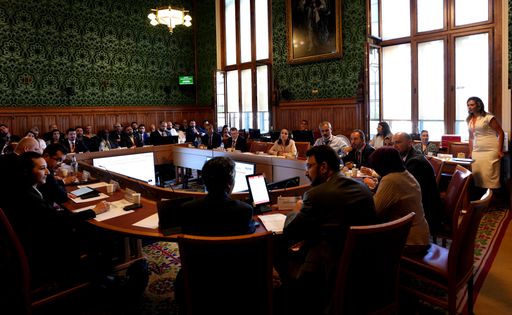Since the 2000s, the United Kingdom has taken significant steps to strengthen its relationship with Türkiye, recognising it as an important economic partner.
In this context, the UK began to pursue defence collaboration with Türkiye, signalling a strategic shift in its foreign policy.
In the immediate aftermath of the July 15, 2016, coup attempt orchestrated by the FETO terrorist organisation, the United Kingdom distinguished itself from other European countries by demonstrating solidarity with Türkiye and President Recep Tayyip Erdoğan.
The UK characterised the coup as “an attack on Turkish democracy”.
Shortly after, former Prime Minister and then-UK Foreign Secretary Boris Johnson travelled to Türkiye in September, further cementing the UK's alliance with the country.
The following year, in January 2017, former Prime Minister Theresa May made an official visit to Türkiye, holding high-level diplomatic talks aimed at advancing and deepening bilateral relations in defence, trade and security.
The strength of this partnership has also been evident in subsequent years.
During Operation Peace Spring in 2019, Türkiye launched a military operation against the YPG—the Syrian branch of the PKK terrorist organisation—in defence of its borders and national security.
Unlike countries such as Germany and France, the UK did not adopt a hostile stance toward Türkiye during this period.
This solidarity has represented an alternative approach to European security policies, NATO’s evolving role, and a reduced reliance on the US-led security framework, as regional insecurity has continued to grow over the past decade.
Defence projects
The first agreement between the two countries, from 1983 to 1985, saw British Aerospace sell 72 Rapier B1 low-altitude air defence missiles to Türkiye for £290 million.
During the same period, the United Kingdom procured 24 GEC Marconi's Blinfire reconnaissance and fire control radars for the Turkish Air Force.
The partnership extended to radio and communication systems, torpedo and missile systems, radar and battle management systems, satellite communication systems, and radio terminals, as well as two projects: the National Combat Aircraft (MMU) and the procurement of the Eurofighter Typhoon fighter jet
The TF-2000 Turkish Frigate Project was initially launched in the 2010s. It is a modern class of frigates that Türkiye aims to develop entirely with national resources, featuring long-range air defence capabilities.
Within the scope of the project, new-generation warships equipped with advanced sensors, radars, electronic warfare systems, air defence missiles, and modern command and control technologies are expected to be developed for the Turkish Navy.
The 4 to 6 TF-2000 frigates are scheduled for delivery to the Turkish Navy by 2030.
Both countries have also begun working on Türkiye’s national frigate project.
Initially, negotiations were conducted with British defence firms concerning the multifunctional radar systems and electronic warfare technologies to be included on the TF-2000.
BAE Systems and Thales UK provided technical consultancy and engineering support, particularly in the fields of radar and sensor technologies.

In addition, Turkish engineers received know-how and technical support from British engineers during the development of Türkiye’s own electronic warfare systems.
National combat aircraft
Another project involving high-level cooperation between Türkiye and the UK is the National Combat Aircraft (MMU).
The project began in August 2016 under the prime contractor Turkish Aerospace Industries (TAI).
The MMU is planned to replace the F-16s, which the Republic of Türkiye aims to phase out of its inventory by the 2030s.
After Türkiye procured the S-400 air defence system from Russia, the US imposed sanctions on Ankara under CAATSA (Countering America's Adversaries Through Sanctions Act).
Türkiye was also removed from the F-35 fighter jet program, which accelerated the country's efforts to develop a domestically produced combat aircraft.
Türkiye, in its effort to develop a national combat aircraft, has made significant agreements with the United Kingdom, including provisions for the transfer of technical know-how.
The initiation of such a project following Türkiye’s removal from the F-35 program clearly underscores its aspiration for autonomy in both technology and the defence industry.
The United Kingdom’s commitment to fulfilling Türkiye’s technological requirements serves as a clear indication of its intent to position itself as a reliable technological actor among regional stakeholders.
Following Türkiye's removal from the US F-35 fighter jet sales programme, Türkiye has expressed interest in the Eurofighter Typhoon Combat Aircraft as an alternative to the F-16V, aiming to enhance its inventory in this area.
The EF-2000 is described as a modern weapon platform that stands out with its advanced multi-role capabilities. Due to its high-performance role-switching (swing-role) capability, it can quickly perform multiple operational missions in a single sortie.
Because the Eurofighter has a multinational structure, any potential sale would require approval from the governments of the United Kingdom, Germany, Italy, and Spain.
Although the German government rejected the potential sale to Türkiye in parliament in April, British Defence Minister Maria Eagle demonstrated her support for Türkiye in a speech to Parliament, stating, "The United Kingdom supports the potential sale of Eurofighter Typhoon fighter jets to Türkiye."
Alliance redefined
Germany’s change in stance toward Türkiye following US Vice President J.D. Vance’s address at the Munich Security Conference exposes underlying fault lines in European defence coordination.
Türkiye, through its independent and successful defence industry initiatives, demonstrates considerable potential within the context of Europe’s increasingly fragile defence architecture.
The partnership between Türkiye and the United Kingdom highlights Türkiye's pivotal role in reshaping the security architecture of continental Europe.
Türkiye is actively pursuing the status of an autonomous actor in the realms of technology and the defence industry.
Simultaneously, the United Kingdom, under its “Global Britain” vision, seeks to extend its influence beyond the European continent through both military assistance and the transfer of technical expertise.
The deepening of the bilateral alliance holds significant implications for the international balance of power, with the potential to reshape security dynamics on NATO's southern flank, across the Middle East, and even within the Indo-Pacific region.




















